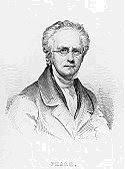
Thursday, June 26, 2008
from Italie pittoresque: Tableau historique et descriptif de l'Italie, du Piémont ... par Jacques Marquet de Norvins, 1836

Sunday, June 22, 2008
from Observations on Italy by John Bell, 1835

A refreshing breeze had succeeded to the oppressive heat of an intensely warm day; the low declining sun, now setting behind the hills, cast a lengthened shadow over the landscape, and gave a pleasing variety to unwooded but rural and richly-cultivated scenery. It was Sunday, and the streets of the city were filled with well-dressed people, most of whom, especially the women, were tall and handsome. There were no carriages; no crowding or bustling in the streets; the whole presenting a character of quiet serenity, which pleasingly reminded me of the Sabbath of a long summer day in a country town of
from L'Italie, la Sicile, Malte, la Grèce, l'Archipel, les îles Ioniennes et la ... par Jean Giraudeau de St. Gervais, 1835

Plaisance, ville située sur la droite du Pò, est entourée de ramparts en terre, qui sont la promenade favorite des habitans. Comme défense, ces ramparts seraient une dérision; la mitraille n'aurait rien à faire pour s'en emparer, la fusillade mème serait du luxe. On croirait, en entrant à Plaisance, pénétrer dans un désert; et pourtant quelques édifices remarquables, encore debout, attestent l'ancienne splendeur d'une cité où François-Sforze commit, en 1448, tant de sacriléges dévastations. Jamais, depuis lors, Plaisance n'a pu se relever. Nous l'avond trouvée morte aux plaisirs et aux agitations des autre ville d'Italie, et nous l'avons quittée comme on quitte un cercueil.
Friday, June 13, 2008
from The narrative of a journey, undertaken in the years 1819, 1820 & 1821 by James Holman, 1834 (fifth edition)

"It is the secret sympathy,
The silver link, the silken tie;
Which heart to heart, and mind to mind,
In body and in soul doth bind"(1)
from Memoir and Correspondence of the Late Sir James Edward Smith, 1832
Thursday, June 5, 2008
from Italy by Josiah Conder, 1831

It is a handsome, though not a large city, surrounded with earthen ramparts, and defended by a castle, but is far from being a strong place. The population was estimated in 1823, at 28,000. The Piacenzan nobility are comparatively wealthy as well as numerous. Unenlivened, however, by the residence of any court, being now but the secondary town of a secondary State, the city has a very dull appearence. 'To judge by its silent, empty streets,' says Lady Morgan, 'and its dismantled edifices, it seemed to have been lately swept by pestilence, or depopulated by famine. This desolate appearance is partly owing to the economy of the palaces. The lower windows, without glass, are filled with massive iron bars, and look like prisons. The shutters of the windows of the second floors are ususally closed; and the third story is too high to catch attention. This is the general aspect of the great houses, as the South is approached, particularly in the smaller cities'.
Wednesday, June 4, 2008
from Notes on Italy by Rembrandt Peale, 1831


